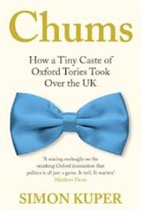“Pigs at the trough” – Chums by Simon Kuper

There are, it seems to me, two kinds of people in the world: those who have woken in despair a great many times since 2016 and those who think the UK is on the right track.
There are those, even now, even after letting the bodies pile up, even after the parties and the public money given to donors, even after the pornography in the Commons and the Electoral Commission being deprived of its independent status and – you know – all the rest of it, who would still vote for the Conservatives tomorrow.
I can’t imagine for one second that reading Simon Kuper’s book, Chums (How a tiny caste of Oxford Tories took over the UK), would change any of their minds.
This book, Kuper tells us, “is not an attempt to relitigate the Brexit referendum” nor is it “a twee Oxford tale of witticisms exchanged by long-dead dons”; rather it is “an attempt to write a group portrait of a set of Tory Brexiteers” because “it won”:
“It ended up making Brexit and remodelling the UK. To understand power in today’s Britain requires travelling back in time to the streets of Oxford, somewhere between 1983 and 1993.”
Kuper, you’ll come to understand, was at Oxford at more or less the same time as Johnson, Gove, Rees-Mogg, Cameron, Dominic Cummings (and their cheerleaders Toby Young, Nick Robinson etc).
While there is a little of Kuper here (his own fleeting experience of Oxford shimmers like a heat haze around the story he is telling), what we are doing is following a small group of men as they transfer all of the advantage of Eton to Oxford, walking around like they own the place, doing what they please because no one has ever told them otherwise and getting away with it, time and time again.
What you take away from Chums is that these people have, for the most part, always been the way they are now: Rees-Mogg has always been old fashioned, Johnson has always been entitled, boorish and obnoxious, Cameron was always destined to be the leader (for a bit, until Johnson knifed him in the back).
This is not a place you come to be surprised in that way. There are still, however, moments in which you can’t help but feel (sadly) why are there not more people saying this kind of thing:
“Brexit has been billed as an anti-elitist revolt. More precisely, it was an anti-elitist revolt led by an elite: a coup by one set of Oxford public school boys against other, backed by an Australian Oxford public schoolboy media magnate masquerading as an anti-elitist.
Cameron’s biggest mistake?
“If Remain was to win, Cameron would have to launch personal attacks on Johnson and Gove. But he didn’t want to. He continued to believe in the unified establishment. They were all good chaps, and once he had won the referendum, they would make up again. He wasn’t going to fight dirty.”
Certain inalienable truths (like “The country’s elite passes down advantage from generation to generation”) prick your thumbs as you read.
“Statistics of this kind have become so familiar, like scientists’ warnings about climate change, that we barely absorb them any more. Yes, British inequality is dreadful, and it helped prompt the vote for Brexit, but that’s the way the system works.”
It’s all somewhat dispiriting at times and Chums doesn’t really offset the old despair we were talking about at the start of the review. The solutions Kuper offers (such as Oxford becoming more of a training ground than an actual university) don’t feel like they are likely to gain much traction whilst this particular set of pigs is at the trough.
But, it’s worth saying, the stories of Balfour as Prime Minister (between 1902-1905), another seat of his pants Tory who got away with doing the bare minimum, did at least make me feel like: we’ve been here before and maybe we’ll survive it with democracy intact. Maybe.



